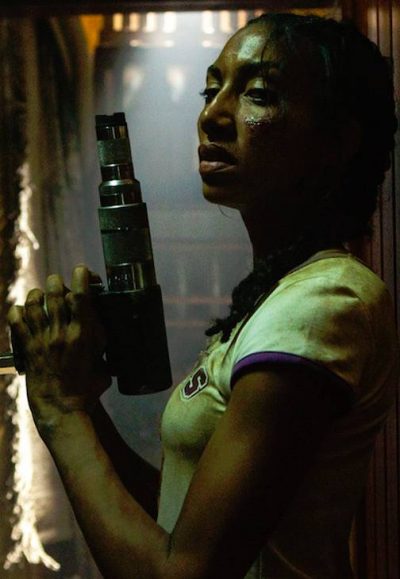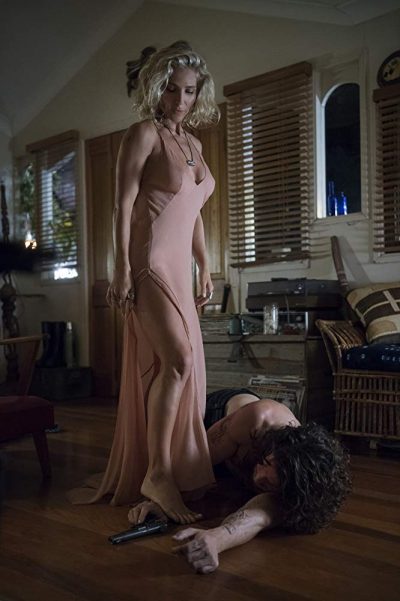★★★★
“Guess a new domain name is needed…”

 Lurking behind one of the most cringeworthy titles I’ve ever seen, and a trailer that’s not much better, is a very pleasant surprise. Well, at least if you’re a fan of the “splatstick” genre, mixing over-the-top gore and comedy: Peter Jackson’s Brain Dead is the pinnacle of that genre. I certainly am, and consequently found this a real hoot. Girls volleyball team, the Falcons, are on their way home after their latest victory, when they end up diverted into a small town, populated entirely by inbred rednecks (or the Gallic version thereof). After an encounter in the hotel, they find themselves getting a night-time visit, and are soon being hunted down by the village’s residents. However, the biggest psycho may not be among the locals…
Lurking behind one of the most cringeworthy titles I’ve ever seen, and a trailer that’s not much better, is a very pleasant surprise. Well, at least if you’re a fan of the “splatstick” genre, mixing over-the-top gore and comedy: Peter Jackson’s Brain Dead is the pinnacle of that genre. I certainly am, and consequently found this a real hoot. Girls volleyball team, the Falcons, are on their way home after their latest victory, when they end up diverted into a small town, populated entirely by inbred rednecks (or the Gallic version thereof). After an encounter in the hotel, they find themselves getting a night-time visit, and are soon being hunted down by the village’s residents. However, the biggest psycho may not be among the locals…
Afonso does a great job in depicting the heroines with broad strokes. You quickly establish the egotistical star player Morgane (Azem), up and coming star Jeanne (Daviot), nerdy M.A. (Balchere), etc. They’re all overseen by their distinctly non-athletic coach (Solaro), who treats them as if they were one big, dysfunctional family. Yet these internal tensions often threaten their literal survival. It was clear to me (if not many reviewers!) that Afonso is parodying the slasher genre: he takes it to such extremes, with the girls bickering over boyfriends even as their pursuers are mere feet away. That’s where this differs from the other “women’s sports team in wilderness peril” movie – yes, it’s a genre… well, there are two – Blood Games, which took itself seriously. He does an equally nice job with the villains. For example, rather than having hunting dogs, there’s one local who pretends to be a dog, playing the sound of hounds baying over a bullhorn.
It’s just one of the many times where this film subverts the audience’s expectations, not least in having heroines with their own set of flaws. Also included there is the country-and-western singer who hitches a ride on the team’s camper van, interrupting proceedings to offer sardonic commentary on proceedings. “The players on this team were all kind of hot”, he sings at the start, going on, “Another thing they have in common, is that they die before the end.” [Is he telling the truth? I won’t say…] Inevitably, of course, there’s a rather dumb scene where the girls use volleyballs to attack their enemies, and the climax doesn’t actually stick in the mind as well as many of the scenes which preceded it. The attack chihuahua, or the headless corpse that Just. Won’t. Die.
If you took this seriously, it would potentially be thoroughly offensive – though it’s entirely equal-opportunity in its approach there. Men, women, gay or straight: no-one here gets out alive. Just, for the love of all that is holy, skip the dubbed version on Netflix, and watch it subtitled. I caught a few seconds before lunging for the remote control, and my ears may still be bleeding.
Dir: Olivier Afonso
Star: Tiphaine Daviot, Manon Azem, Louise Blachère, Victor Artus Solaro





 We’ve seen Ngo, the star here, previously on this site in
We’ve seen Ngo, the star here, previously on this site in  This wasn’t quite what we expected. In fact, replace “quite” with “at all”. It starts off as looking like some kind of revenge porn, with pathologist Margaret Powers (Tyson) kidnapping Finnbar (Ward), the man she’s certain murdered her son. Finnbar was apparently able to get away with it, because he was the son of a notorious local criminal, Tommy O’Neil (Hayman). She wants Finnbar to confess to his crime, and recruits her son’s ex-girlfriend, Zoe (Jarvis) to help in getting her vengeance. Initially, the capture goes well, with the two women then holing up in an abandoned warehouse by the docks, to begin the interrogation. However, this is where the film starts to diverge from the expected, as it turns out Zoe’s intentions are not in line with Margaret’s, as they initially appeared.
This wasn’t quite what we expected. In fact, replace “quite” with “at all”. It starts off as looking like some kind of revenge porn, with pathologist Margaret Powers (Tyson) kidnapping Finnbar (Ward), the man she’s certain murdered her son. Finnbar was apparently able to get away with it, because he was the son of a notorious local criminal, Tommy O’Neil (Hayman). She wants Finnbar to confess to his crime, and recruits her son’s ex-girlfriend, Zoe (Jarvis) to help in getting her vengeance. Initially, the capture goes well, with the two women then holing up in an abandoned warehouse by the docks, to begin the interrogation. However, this is where the film starts to diverge from the expected, as it turns out Zoe’s intentions are not in line with Margaret’s, as they initially appeared. ★★½
★★½ Proof that a lack of originality is not necessarily a bar to being an entertaining movie, this pulls together elements from all over the place, but probably most notably, The Long Kiss Goodnight and John Wick. You have the “former assassin now leading an idyllic family life, until her past catches up with her” of the former. And the “Oh, they’re surely not going to kill tha… Hoo-boy. The hero/ine is going to be VERY angry with them” of the latter, among other elements.
Proof that a lack of originality is not necessarily a bar to being an entertaining movie, this pulls together elements from all over the place, but probably most notably, The Long Kiss Goodnight and John Wick. You have the “former assassin now leading an idyllic family life, until her past catches up with her” of the former. And the “Oh, they’re surely not going to kill tha… Hoo-boy. The hero/ine is going to be VERY angry with them” of the latter, among other elements. Cal McTeer (Best) has just got out of prison after serving a 12-year sentence for arson leading to murder, a crime she committed as a teenager. Returning to her home town of Orphelin Bay, she finds her brother, Augie (Jakubenko), now working as a conduit for drugs, with the connivance of at least some local cops, and supplied by the mysterious Adrielle Cuthbert (Pataky). She oversees a commune near town called L’Attente with a zero-tolerance policy for dissent, and uses the proceeds of her narco-aquatics to fund a worldwide search for mysterious fragments of pottery. Turns out she is queen of the Tidelanders: the offspring of humanity and legendary sirens who inhabit the ocean. Though Cal doesn’t know it initially, a near-death experience shows that she is of similar stock. Adrielle doesn’t like the competition. And neither does local gangster Gregori Stolin (Koman), who is intent on muscling in on Augie’s business, and cutting out the middleman, to work directly with Adrielle.
Cal McTeer (Best) has just got out of prison after serving a 12-year sentence for arson leading to murder, a crime she committed as a teenager. Returning to her home town of Orphelin Bay, she finds her brother, Augie (Jakubenko), now working as a conduit for drugs, with the connivance of at least some local cops, and supplied by the mysterious Adrielle Cuthbert (Pataky). She oversees a commune near town called L’Attente with a zero-tolerance policy for dissent, and uses the proceeds of her narco-aquatics to fund a worldwide search for mysterious fragments of pottery. Turns out she is queen of the Tidelanders: the offspring of humanity and legendary sirens who inhabit the ocean. Though Cal doesn’t know it initially, a near-death experience shows that she is of similar stock. Adrielle doesn’t like the competition. And neither does local gangster Gregori Stolin (Koman), who is intent on muscling in on Augie’s business, and cutting out the middleman, to work directly with Adrielle. If you took four different films, by four different directors, and edited them together into a single entity, you might end up something similar to this. Oh, make no mistake: I still enjoyed most of this. It just doesn’t feel like a coherent whole, perhaps because it is a spin-off involving some of the same characters from an earlier film, Baby. For at least three-quarters of it, however, not having seen its predecessor shouldn’t be too much of a problem.
If you took four different films, by four different directors, and edited them together into a single entity, you might end up something similar to this. Oh, make no mistake: I still enjoyed most of this. It just doesn’t feel like a coherent whole, perhaps because it is a spin-off involving some of the same characters from an earlier film, Baby. For at least three-quarters of it, however, not having seen its predecessor shouldn’t be too much of a problem. Rapace appears to be aiming for a niche in the straight-to-video (or, at least, straight to Netflix) action market, this coming on the heels of
Rapace appears to be aiming for a niche in the straight-to-video (or, at least, straight to Netflix) action market, this coming on the heels of  Do not mistake the above rating for suggesting that this is a “good” movie. By most normal standards, it would hardly qualify. But what we have is a throwback to the glory days of exploitation, in particular Filipino women-in-prison flicks like The Big Doll House or
Do not mistake the above rating for suggesting that this is a “good” movie. By most normal standards, it would hardly qualify. But what we have is a throwback to the glory days of exploitation, in particular Filipino women-in-prison flicks like The Big Doll House or  Malorie Hayes (Bullock) is nervously heading towards the birth of a child, supported by her sister (Hayes), when a mysterious epidemic of suicidal psychosis breaks out worldwide. In the ensuing carnage, Malorie finds shelter in the home belonging to the acidic Douglas (Malkovich), whose wife dies trying to help Malorie, and a small number of other survivors. They figure out the epidemic is triggered by entities of some kind who are now prowling the planet – if you see them, you are overwhelmed by your worst fears and kill yourself. The obvious defense is not to make eye contact. Yet how do you survive in a world you cannot see? Especially when it turns out that those who were previously psychopathically inclined are immune to the effects, and are free to roam that world, with their sight intact.
Malorie Hayes (Bullock) is nervously heading towards the birth of a child, supported by her sister (Hayes), when a mysterious epidemic of suicidal psychosis breaks out worldwide. In the ensuing carnage, Malorie finds shelter in the home belonging to the acidic Douglas (Malkovich), whose wife dies trying to help Malorie, and a small number of other survivors. They figure out the epidemic is triggered by entities of some kind who are now prowling the planet – if you see them, you are overwhelmed by your worst fears and kill yourself. The obvious defense is not to make eye contact. Yet how do you survive in a world you cannot see? Especially when it turns out that those who were previously psychopathically inclined are immune to the effects, and are free to roam that world, with their sight intact.